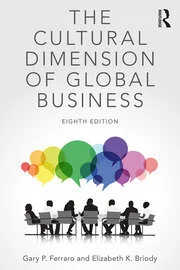The Cultural Dimension of International Business: An Overview of Gary P. Ferraro and Elizabeth K. Briody’s Contributions
International business has expanded tremendously in the past few decades, with companies now operating in multiple countries and cultures. As a result, it has become increasingly important for businesses to understand the impact of culture on their operations. This is where the contributions of Gary P. Ferraro and Elizabeth K. Briody come into play. Both authors have extensively researched and written about the cultural dimension of international business, with a focus on how cultural factors shape and influence business practices.
Gary P. Ferraro
Gary P. Ferraro is a professor of anthropology at the University of North Carolina at Charlotte. He has authored several books and articles on the intersection of culture and business, including the textbook The Cultural Dimension of International Business. Ferraro’s research and writing focus on the impact of culture on various aspects of business, such as communication, negotiation, and leadership. He emphasizes the importance of understanding cultural differences in order to create successful business relationships and practices.
Elizabeth K. Briody
Elizabeth K. Briody is a cultural anthropologist and senior research scientist at Decision Processes International. She has worked in over 40 countries, providing consulting services to corporations on cultural issues in international business. Briody’s research centers on the role of culture in business decision-making and change processes. She has co-authored several publications with Ferraro, including the book The Cultural Dimension of Global Business.
The Cultural Dimension of International Business
In their book The Cultural Dimension of International Business, Ferraro and Briody argue that culture is a crucial yet often overlooked aspect of global business. The book provides a comprehensive overview of the impact of culture on various aspects of business, including management, marketing, and cross-cultural communication. It also offers practical advice for navigating cultural differences in international business settings.
One of the key insights from the book is that culture impacts every level of a business, from individual interactions to overarching strategies. This means that understanding and adapting to different cultures is essential for successful business operations. Ferraro and Briody also highlight the role of cultural awareness in building trust and forming relationships with business partners from different cultures.
The authors emphasize that culture is not just about national or ethnic identities, but encompasses a wide range of factors such as social class, religion, and gender. They also caution against cultural stereotypes and emphasize the importance of conducting thorough research and gaining a deep understanding of a culture before making business decisions.
The Impact of Culture on Business Practices
Ferraro and Briody’s work highlights how cultural factors can shape a variety of business practices. For example, in some cultures, relationships and personal connections are highly valued, and business decisions are made based on trust and mutual understanding. In contrast, in other cultures, such as the United States, business is more transactional and based on individual merit.
Cultural differences also impact communication styles and negotiation tactics. In some cultures, communication is direct and confrontational, while in others, it is more indirect and avoids conflict. Negotiation styles may also vary based on cultural preferences, such as seeking win-win solutions versus focusing solely on individual gain.
Furthermore, cultural differences can also impact decision-making processes and organizational structures. In some cultures, there is a clear hierarchy, and decisions are made by top-level executives, while in others, decision-making is more decentralized and involves input from multiple levels of employees.
In Conclusion
The work of Gary P. Ferraro and Elizabeth K. Briody has greatly contributed to the understanding of the cultural dimension of international business. Their research and insights have helped businesses navigate complex cultural differences and form successful partnerships with organizations and individuals from diverse backgrounds. As the global business landscape continues to evolve, their contributions remain crucial in promoting cultural awareness and facilitating effective cross-cultural communication.



